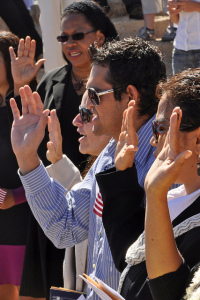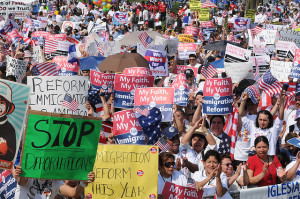Filing for naturalization is relatively simple when compared to applying for a green card. Becoming a U.S. citizen is generally recommended: you get to vote for elected officials, obtain federal jobs, sponsor immediate relatives for green cards, travel freely with a U.S. passport, and gain immunity from deportation or removal.
green card. Becoming a U.S. citizen is generally recommended: you get to vote for elected officials, obtain federal jobs, sponsor immediate relatives for green cards, travel freely with a U.S. passport, and gain immunity from deportation or removal.
But the naturalization process opens you up to further scrutiny by the U.S. Government. You are inviting U.S. Citizenship & Immigration Services (USCIS) to review your entire immigration record. So beware of the pitfalls.
Fraud, lies and misleading statements that were previously overlooked could come to USCIS’ attention when you file for naturalization. In some cases, the misrepresentation is innocent, unintentional, or purely out of embarrassment. In others, a finding of misrepresentation is based on USCIS’ faulty reasoning or misguided assumptions. Either way, you are on the defensive.
If USCIS finds that you previously committed fraud, lied, or made misleading statements to the U.S. government or to gain immigration benefits, it may deny your application. Even worse, you could be placed in removal proceedings and risk losing your permanent resident status.
The following are common cases in which USCIS may detect fraud or misrepresentation during — and not before — the naturalization process:
Case #1: Natalia is granted lawful permanent resident status based on an approved Form I-360 (religious worker) petition.
After being a permanent resident for five years, she files for naturalization. USCIS then investigates the religious organization that petitioned for her and finds that it does not exist and was not in operation when it filed the I-360 petition for Natalia. USCIS concludes that Natalia never worked for the religious organization.
Case #2: Sergio is granted a K-1 visa based on a Form I-129F petition that his U.S. citizen fiancée filed for him. After arriving in the U.S., he marries his fiancée within 90 days and files his Form I-485 application to adjust to permanent resident status. The USCIS Service Center grants him conditional resident status without an interview. Two years later, Sergio files a timely Form I-751 petition to remove the conditions on his permanent residency. The USCIS Service Center approves the petition without an interview.
After being a permanent resident for three years, Sergio files for naturalization. At the naturalization interview, he reveals that he is separated from his U.S. citizen spouse and that they no longer live together. USCIS then conducts an investigation that leads them to believe the couple entered into a sham marriage to gain immigration benefits.
Case #3: Maya enters the United States on a tourist visa and files for asylum within one year of her arrival. On her asylum application, she falsely claims her brother as her spouse with the hope that he can later come to the United States as a derivative beneficiary. She next enters into a bona fide marriage to a U.S. citizen, who files an immigrant petition for her. USCIS approves Maya’s marriage-based green card application, which does not list any prior marriages.
When Maya applies for naturalization, USCIS reviews her file and finds the asylum application. USCIS requests the divorce decree showing that she terminated the prior marriage, which she claimed on her asylum application. USCIS wants the divorce decree to confirm whether Maya was legally free to marry her U.S. citizen spouse. Maya cannot produce the divorce decree because the spouse she claimed on her asylum application is actually her brother.
Case #4: Igor enters the United States on an immigrant visa based on an I-130 petition that his lawful permanent resident mother filed for him. But between the time his mother filed the petition and the time he obtained the immigrant visa, Igor secretly married his high school sweetheart without their parents’ consent. Igor is unaware that the marriage disqualified him from immigrating under the family second-preference category, which applies to unmarried (but not to married) children of permanent residents.
During the naturalization process, USCIS investigates Igor’s immigration history and discover the marriage certificate.
These cases are common scenarios that attorneys are asked to evaluate after the applicant has already filed for naturalization and is now facing a denial or a Notice to Appear in removal proceedings. The better choice is to consult the attorney before you file for naturalization.
Fraud, lies and misleading statements go hand in hand with whether you lawfully obtained your permanent residence and meet the good moral character requirement to qualify for naturalization.
If you did not qualify for permanent residency in the first place, then you are not eligible for naturalization.
And to naturalize, you must show that you have been a person of good moral character during the statutory period. In general, the statutory period begins 3 to 5 years prior to filing the application. USCIS can also consider bad acts before the statutory period, if during the current 3 or 5 year period, you haven’t shown rehabilitation, or if the past bad acts relate to your current moral character. All applicants must show they continue to be a person of good moral character until they naturalize.
Giving false testimony, under oath or affirmation, to obtain immigration benefits during the statutory period prevents you from showing good moral character. This mandatory bar applies even if you were granted a waiver of misrepresentation during the green card application process.
As of the date of this post, the latest 9/13/13 version of the N-400 form, asks:
Have you ever given any U.S. Government official(s) any information or documents that was false, fraudulent or misleading? [Question 31, part 11, page 17)]
Have you ever lied to any U.S. Government official to gain entry or admission into the United States or to gain immigration benefits while in the United States? [Question 32, part 11, page 17)]
Past misrepresentation or misrepresentation on the naturalization application itself or during the naturalization interview may lead to a denial of your application. Although rare, your citizenship can also be revoked through “denaturalization” if USCIS later discovers the misrepresentation.
When a denial is without prejudice, you may reapply for naturalization after a certain period has passed. But you might not get a second shot. Instead, you could face deportation. If you don’t qualify for any relief or if your request for relief is denied, you risk losing your permanent resident status and being ordered removed from the United States.
Talk to an attorney before you file for naturalization. A qualified attorney can help you determine whether you qualify for naturalization, present negative facts in the best light possible, and pinpoint red flags that may lead to a denial and/or put you at risk of removal. The attorney can also help you evaluate a denial and determine whether to appeal it, file a new application later, or let things be.
This article provides general information only. Do not consider it as legal advice for any individual case or situation. Each legal case is different and case examples do not constitute a prediction or guarantee of success or failure in any other case. The sharing or receipt of this information does not create an attorney-client relationship.
SUBSCRIBE CONTACT
# # #
Photo by: Grand Canyon National Park

 The White House added, “Since 2002, more than 102,000 men and women, including individuals serving in Iraq, Afghanistan, South Korea, Germany, Japan and elsewhere, have become citizens while wearing the uniform of the U.S. military.”
The White House added, “Since 2002, more than 102,000 men and women, including individuals serving in Iraq, Afghanistan, South Korea, Germany, Japan and elsewhere, have become citizens while wearing the uniform of the U.S. military.”
 green card. Becoming a U.S. citizen is generally recommended: you get to vote for elected officials, obtain federal jobs, sponsor immediate relatives for green cards, travel freely with a U.S. passport, and gain immunity from deportation or removal.
green card. Becoming a U.S. citizen is generally recommended: you get to vote for elected officials, obtain federal jobs, sponsor immediate relatives for green cards, travel freely with a U.S. passport, and gain immunity from deportation or removal.